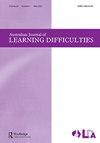The role of phonological processing in children from a national-type Chinese primary school in Malaysia: implications for dyslexia assessment
IF 1.6
Q3 EDUCATION, SPECIAL
引用次数: 1
Abstract
ABSTRACT The Malay language writing system is alphabetic and orthographically transparent. This study aimed to determine whether phonological processing skills predict Malay word-level literacy acquisition in Chinese children from a national-type Chinese primary school in Malaysia. A correlational study among 113 Year 1 Chinese children who are non-native speakers of Malay found that phonological awareness was the only significant predictor of Malay word-level literacy acquisition. The prominent role of phonological awareness among the non-native speakers further supports phonological processing deficit as an etiology of word-level literacy difficulties across languages. We conclude that since the non-native speakers rely exclusively on phonological decoding for word-level acquisition, the effect of a phonological deficit would be detrimental. Therefore, the Malay reading-related assessment battery in this study, now validated for both native and non-native speakers can be adapted as a universal early screening tool for detecting Malaysian children at-risk of dyslexia.马来西亚一所国立华文小学儿童语音加工的作用:对阅读障碍评估的启示
摘要马来语的书写系统是字母和拼写透明的。本研究旨在确定马来西亚一所国立华文小学的中国儿童的语音处理技能是否能预测马来语单词水平的识字习得。一项针对113名非马来语母语的一年级中国儿童的相关研究发现,语音意识是马来语单词水平识字习得的唯一重要预测因素。语音意识在非母语人士中的突出作用进一步支持了语音处理缺陷,将其作为不同语言单词水平识字困难的病因。我们得出的结论是,由于非母语人士完全依赖语音解码来进行单词水平的习得,因此语音缺陷的影响是有害的。因此,本研究中的马来语阅读相关评估组(目前已为母语和非母语人士验证)可以作为一种通用的早期筛查工具,用于检测有阅读障碍风险的马来西亚儿童。
本文章由计算机程序翻译,如有差异,请以英文原文为准。
求助全文
约1分钟内获得全文
求助全文
来源期刊

Australian Journal of Learning Difficulties
EDUCATION, SPECIAL-
CiteScore
1.80
自引率
11.10%
发文量
8
 求助内容:
求助内容: 应助结果提醒方式:
应助结果提醒方式:


